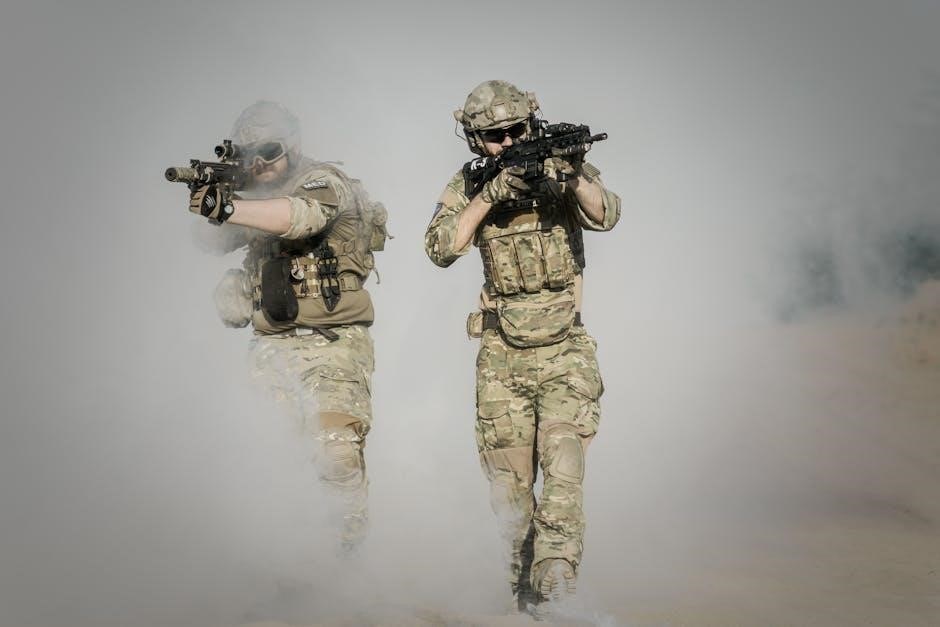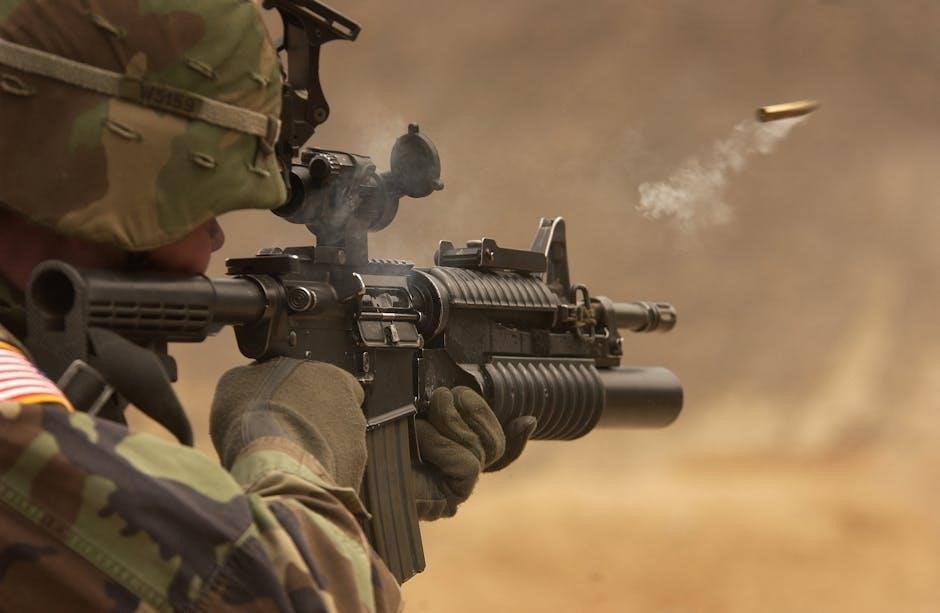Welcome to the Gun Trader’s Guide, your comprehensive handbook for buying, selling, and trading firearms safely and responsibly. This guide offers practical advice, legal insights, and essential safety tips to help you navigate the world of gun trading with confidence.
Overview of the Gun Trading Market
The gun trading market is a dynamic and regulated industry that involves the buying, selling, and trading of firearms. It caters to various groups, including collectors, hunters, sport shooters, and law enforcement. The market operates through both private sales and licensed dealers, with transactions governed by federal, state, and local laws. Factors such as supply and demand, economic trends, and legislative changes significantly influence market dynamics. Online platforms and auctions have become increasingly popular, offering convenience but also requiring caution to avoid scams. Understanding the market’s intricacies is essential for participants to navigate it safely and ethically, ensuring compliance with legal requirements while meeting their needs.
Understanding the Basics of Gun Trading
Gun trading involves the exchange of firearms between buyers and sellers, requiring a solid understanding of the process, terminology, and market dynamics; It’s essential to recognize the different types of firearms, their intended uses, and their value based on condition, rarity, and demand. Participants include private sellers, licensed dealers, and collectors. Effective communication and negotiation skills are crucial for successful trades. Researching market trends and pricing helps traders make informed decisions. Understanding the differences between new and used firearms, as well as the role of appraisals, is vital. Building trust and transparency with trading partners ensures smooth transactions. This foundation of knowledge is key for anyone looking to engage in gun trading responsibly and effectively.

Legal Considerations in Gun Trading
Navigating federal, state, and local laws is crucial in gun trading. Ensure compliance with firearms regulations, obtain necessary permits, and conduct background checks to avoid legal issues.
Federal Firearms Laws and Regulations
Federal firearms laws are enforced by the Bureau of Alcohol, Tobacco, Firearms, and Explosives (ATF). Compliance is essential for legal gun trading. All firearms transactions must follow the Brady Handgun Violence Prevention Act, requiring background checks for buyers. Dealers must maintain proper records and conduct transactions using Form 4473. The National Instant Criminal Background Check System (NICS) is used to verify eligibility. Prohibited persons, including felons, drug addicts, and those with restraining orders, cannot purchase firearms. Age restrictions apply, with rifles requiring buyers to be at least 18 and handguns requiring buyers to be 21 or older. Violations of federal laws can result in severe penalties, including fines and imprisonment. Staying informed about updates to these regulations is crucial for all gun traders.
State and Local Laws Impacting Gun Sales
State and local laws significantly influence gun sales, varying widely across jurisdictions. Some states impose waiting periods or require additional background checks beyond federal requirements. Certain states restrict the sale of specific firearms, such as assault weapons or high-capacity magazines. Local ordinances may dictate where gun stores can operate, often prohibiting them near schools or residential areas. Private sales and gun shows are subject to differing regulations, with some states mandating background checks for private transactions. Understanding these laws is critical, as violations can lead to legal consequences. Gun traders must research and comply with both state and local regulations to ensure legal and ethical transactions. Failure to adhere to these laws can result in fines, license revocation, or criminal charges.
Obtaining Necessary Licenses and Permits
Obtaining the proper licenses and permits is a critical step for anyone involved in gun trading. In the U.S., firearms dealers must acquire a Federal Firearms License (FFL) from the Bureau of Alcohol, Tobacco, Firearms, and Explosives (ATF). This license ensures compliance with federal regulations and allows legal firearm sales. The process involves submitting an application, paying a fee, undergoing a background check, and ensuring your business meets all legal requirements. State and local governments may also require additional permits or licenses. Failure to obtain these can result in fines, legal action, or the shutdown of your business. Always verify the specific licensing requirements in your area to operate legally and avoid penalties.

Safety and Best Practices
Prioritizing safety is essential in gun trading. Always handle firearms responsibly, store them securely, and ensure buyers are legally eligible. Use locked cases for transportation and verify identities to prevent illegal sales. Follow local laws and consider additional safety training for comprehensive guidance.
Firearm Safety Tips for Buyers and Sellers
Firearm safety is paramount for both buyers and sellers. Always treat every gun as if it’s loaded, and ensure the muzzle is pointed in a safe direction. Conduct transactions in well-lit, public areas to minimize risks. Sellers should verify the buyer’s legal eligibility through background checks or proper documentation. Buyers must inspect the firearm for functionality and safety before handling it. Use protective gear like eye and ear protection during test-firing. Both parties should avoid carrying additional firearms during the exchange to prevent accidental discharge. Secure firearms in locked cases during transportation, and never leave them unattended. Open communication and mutual respect are key to a safe and successful transaction.

Secure Storage and Transportation of Firearms
Proper storage and transportation of firearms are critical to ensure safety and compliance with the law. Store firearms unloaded in a locked safe or gun vault, using trigger locks for added security. Ammunition should be stored separately from firearms. When transporting firearms, use a locked, hard-sided case to prevent unauthorized access. Always keep firearms out of sight in vehicles to deter theft. Ensure the firearm is unloaded during transport, and consider using a cable lock to secure it. Familiarize yourself with local laws regarding firearm transportation to avoid legal issues. Secure storage and transportation practices help protect against accidents, theft, and misuse, ensuring firearms remain in responsible hands.

The Process of Buying and Selling Guns
Buying and selling guns involves research, understanding market dynamics, and negotiation. Ensure compliance with legal requirements, conduct thorough inspections, and use secure payment methods for safe transactions.
How to Buy a Gun: A Step-by-Step Guide
Buying a gun requires careful planning and adherence to legal procedures. Begin by determining your purpose (e.g., self-defense, hunting) and budget; Research reputable dealers or private sellers. Inspect the firearm for condition, ensuring proper function. Verify the seller’s legitimacy and obtain necessary paperwork. Complete a background check if required. Negotiate the price and ensure secure payment methods. Finally, obtain any required permits and familiarize yourself with local laws. Always prioritize safety and legal compliance throughout the process.
How to Sell a Gun: Key Considerations
Selling a gun involves careful preparation and adherence to legal standards. Start by researching the firearm’s market value using pricing guides or online marketplaces. Determine its condition and ensure proper documentation, including ownership proof. Choose a sales platform, such as a licensed dealer, online marketplace, or private sale, considering fees and convenience. Clean and present the firearm attractively, with clear photos and descriptions. Disclose any flaws honestly to build trust. Ensure compliance with federal, state, and local laws, including background checks and required paperwork. Meet potential buyers in a safe, public location and verify their eligibility; Secure payment through trusted methods to avoid disputes. Follow these steps to ensure a smooth, lawful transaction.
Negotiation Tactics in Gun Trading
Negotiation is a critical skill in gun trading, requiring a balance of assertiveness and respect. Start by researching the firearm’s market value to set realistic expectations. Know your bottom line and be prepared to walk away if terms aren’t favorable. Highlight the gun’s condition, features, and accessories to justify your price. Be transparent about any flaws to build trust. Timing is key—buy low and sell high by understanding market trends. Use silence strategically to avoid overcommitting. Consider counteroffers and compromises, like including accessories or offering a discount for quick sales. Stay calm, professional, and patient to achieve a fair deal. Mastering these tactics ensures successful transactions for both parties.

Evaluating Firearms
Evaluating firearms involves assessing their condition, functionality, and authenticity. Inspect for wear, test mechanical performance, and verify history. Professional appraisals ensure accurate value determination and legal compliance.
Assessing the Condition of a Used Firearm
Evaluating the condition of a used firearm is crucial for determining its value and functionality. Start by inspecting the firearm for visible wear, such as scratches, rust, or dents. Check the barrel for any signs of pitting or excessive wear, as this can affect accuracy. Examine the action to ensure it cycles smoothly and functions properly. Test the trigger pull and safety mechanisms to confirm they operate as intended. Inspect the stock or grip for damage or modifications. Additionally, review the firearm’s history, including its serial number and any previous ownership records. Professional appraisals can provide an objective assessment, helping buyers and sellers agree on a fair price. Proper documentation and maintenance records are also essential for verifying the firearm’s condition and authenticity.
Understanding Firearm Appraisals
Firearm appraisals are essential for determining the value of a gun, whether for sale, insurance, or inheritance; A professional appraiser evaluates factors like rarity, historical significance, and condition to provide an accurate assessment. The process typically involves a detailed visual inspection, functionality testing, and research into market trends. Appraisers consider the firearm’s make, model, and unique features, such as engravings or custom modifications. Historical documentation, like provenance, can significantly increase value. It’s important to distinguish between appraisals and inspections; appraisals focus on monetary value, while inspections ensure safety and functionality. Accurate appraisals help buyers and sellers agree on fair pricing, making them a cornerstone of ethical and transparent gun trading.

Market Dynamics and Trends
The firearm market is shaped by supply and demand, legislation, and cultural shifts. Trends like increased demand for self-defense firearms and technological advancements influence pricing and availability.
Current Trends in the Firearm Market
The firearm market is experiencing significant shifts, driven by evolving consumer preferences and legislative changes. There is a noticeable increase in demand for self-defense firearms, particularly handguns and compact rifles, as more individuals prioritize personal safety. Additionally, concealed carry options are gaining popularity, reflecting a growing emphasis on practicality and ease of use. Technological advancements, such as modular firearm systems and customizable accessories, are also reshaping the industry. Furthermore, the rise of online marketplaces has made firearm trading more accessible, though it necessitates increased vigilance against scams. Traders must stay informed about these trends to make informed decisions and adapt to market dynamics effectively.
Factors Influencing Firearm Prices
Firearm prices are influenced by several key factors, including supply and demand, economic conditions, and legislative changes. High demand for certain models, such as popular handguns or rifles, can drive up prices. Economic downturns, inflation, or production costs also impact pricing. Legal restrictions or bans on specific firearms can create scarcity, increasing their value. Additionally, the reputation of manufacturers plays a role, with well-known brands often commanding higher prices. The condition and age of firearms, especially used ones, also affect their value. Custom modifications or rare features further influence pricing, making some firearms highly sought after by collectors and enthusiasts.
The Role of Auctions in Gun Trading
Auctions play a significant role in gun trading, offering a dynamic marketplace for buying and selling firearms. They provide a platform for competitive bidding, often resulting in higher prices for rare or high-demand firearms. Auctions can be conducted online or in-person, attracting both individual collectors and dealers. This method allows sellers to reach a broader audience and potentially achieve better prices. Buyers, on the other hand, gain access to unique or collectible firearms that may not be available elsewhere. However, auctions require careful preparation, as bidding can move quickly, and participants must be aware of all legal and financial implications before engaging.

Online Platforms for Gun Trading
Online platforms provide accessible marketplaces for buying and selling firearms, offering a broader audience and streamlined transactions. Popular sites include specialized forums and encrypted exchanges, ensuring secure deals.
Popular Online Marketplaces for Firearms
Several online platforms cater specifically to firearm trading, offering secure and regulated environments for buyers and sellers. GunsAmerica, GunBroker, and Armslist are among the most popular, providing extensive listings of firearms, accessories, and related gear. These platforms often feature auction-style sales, fixed prices, and peer-to-peer transactions. Users can browse firearms by type, caliber, and condition, making it easier to find specific models. Many sites also offer forums and reviews, fostering a sense of community and trust. When using these platforms, it’s crucial to verify the legitimacy of sellers and adhere to local laws. Additionally, understanding fees and payment methods is essential for a smooth transaction.
Beware of Scams and Fraudulent Activities
When engaging in online firearm transactions, it’s critical to be vigilant about scams and fraudulent activities. Scammers often pose as legitimate buyers or sellers, using fake identities or misleading listings. Common red flags include unusually low prices, requests for wire transfers, and lack of verification. Always verify the authenticity of sellers and ensure they are licensed dealers. Never share personal or financial information without securing a trusted platform. Using secure payment methods and escrow services can help protect against fraud. Additionally, reporting suspicious activities to platform administrators and local authorities is essential to maintaining a safe trading environment. Stay informed and cautious to avoid falling victim to fraudulent schemes.

Advanced Strategies for Gun Traders
Mastering advanced strategies involves building strong relationships with dealers, understanding resale markets, and leveraging negotiation tactics to maximize profits in firearm trading.
Building Relationships with Dealers and Collectors
Building strong relationships with dealers and collectors is crucial for success in gun trading. Dealers often provide exclusive access to rare firearms, while collectors can offer valuable insights and opportunities. Attend trade shows, join firearm communities, and engage in online forums to network. Trust and reliability are key—honoring agreements and maintaining open communication fosters long-term partnerships. Consider offering fair deals and providing excellent customer service to build a reputation as a trustworthy trader. These relationships can lead to better deals, early access to inventory, and a stronger network for future transactions. Additionally, staying informed about market trends ensures mutually beneficial interactions.
Understanding the Resale Market
Understanding the resale market is essential for any successful gun trader. The resale market involves buying and selling firearms that have already been owned, offering opportunities to acquire rare or cost-effective firearms. Prices in this market are influenced by factors like supply and demand, the condition of the firearm, and current trends. Firearms with original packaging, documentation, or unique features often command higher prices. Auctions and online platforms play a significant role in the resale market, allowing buyers and sellers to connect. For buyers, researching market values and comparing prices is crucial. For sellers, accurate descriptions and competitive pricing attract potential buyers. Staying informed about market dynamics helps traders make informed decisions and maximize profits.

Additional Resources and Support
Explore training programs, workshops, and online forums to enhance your gun trading skills. Stay updated on legal changes and connect with communities for continuous learning and support.
Recommended Training and Workshops
Enrolling in specialized training programs and workshops is essential for mastering gun trading. These sessions cover firearm safety, legal compliance, and negotiation techniques. Practical exercises help build confidence and expertise. Many workshops focus on identifying firearm conditions, understanding market trends, and avoiding scams. Legal seminars are particularly valuable, ensuring traders stay updated on federal and state regulations. Online forums and communities also offer resources for continuous learning. The Gun Trader’s Guide recommends exploring local and national training opportunities to enhance your knowledge and skills in the firearm trading industry. Stay informed and proactive to succeed in this complex and regulated market.
Joining Gun Trading Communities
Joining gun trading communities is a great way to connect with experienced traders, dealers, and collectors. These forums and groups provide valuable insights, tips, and resources for buying, selling, and trading firearms. Many communities host events, workshops, and meetups where members can network and learn from industry experts. Online platforms like specialized forums and social media groups offer real-time updates on market trends and legal changes. By participating in these communities, you can gain access to exclusive listings, negotiate better deals, and build trust within the trading network. Engaging with fellow enthusiasts also fosters a sense of camaraderie and shared knowledge, making the gun trading process more enjoyable and rewarding.
Staying Updated on Laws and Regulations
Staying updated on firearms laws and regulations is crucial for ethical and legal gun trading. Federal agencies like the ATF provide guidelines, while state and local governments enforce specific rules. Regularly check official sources, such as state attorneys general websites or legal databases, for updates. Many communities offer workshops or seminars to help traders understand compliance. Subscribe to newsletters or follow legal experts to stay informed about changes in legislation. Violating laws can lead to severe penalties, so it’s essential to remain vigilant and proactive in understanding legal requirements. By staying informed, you ensure your transactions are lawful and protect yourself from potential legal issues. Always verify information through reputable sources to maintain compliance and avoid misunderstandings.